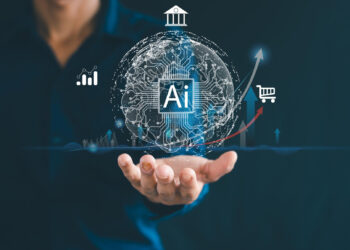Artificial Intelligence (AI) is quickly transforming industries and revolutionizing the way we live and work. From healthcare and education to finance and transportation, the impact of AI is profound and far-reaching. This article explores the future of AI and its potential to reshape various sectors.
The Impact of AI on Various Industries
AI technologies, with advancements in machine learning and natural language processing, are becoming increasingly sophisticated. Businesses are employing AI to automate processes, boost productivity, and gain valuable insights from data analysis. AI-powered chatbots are enhancing customer service experiences, while autonomous vehicles are set to revolutionize transportation.
AI in Healthcare
In healthcare, AI is assisting with early diagnoses, drug discovery, and personalized treatment plans. Some doctors have even begun using a medical AI scribe to streamline their documentation process and free up more time for meeting with patients. Machine learning algorithms can analyze vast amounts of patient data, identifying patterns and predicting potential health issues. This enables healthcare professionals to make more accurate diagnoses and develop effective treatment strategies. AI applications are also being used to streamline administrative tasks, such as appointment scheduling and medical record management, freeing up time for healthcare providers to focus on patient care.
AI is playing a crucial role in drug discovery, accelerating the process of identifying potential new treatments. Machine learning models are trained on vast databases of chemical compounds and their properties, enabling scientists to predict the effectiveness of new drug candidates. This has the potential to drastically reduce the time and cost involved in bringing new drugs to market.
AI in Finance
The finance industry is also benefiting from Artificial Intelligence technologies. AI-powered algorithms can analyze vast amounts of financial data, identify patterns, and make predictions with high accuracy. This is particularly valuable in investment management, where AI can help optimize portfolio allocation and make informed trading decisions.
AI-powered chatbots are being used by financial institutions to enhance customer service experiences. These chatbots can answer customer queries, provide personalized recommendations, and even facilitate transactions. This not only improves customer satisfaction but also reduces the need for human customer service representatives, saving costs for financial institutions.
AI in Manufacturing
Artificial Intelligence is revolutionizing the manufacturing industry by enabling automation and optimization of production processes. Intelligent robots equipped with AI capabilities can perform complex tasks with precision and efficiency. These robots can work alongside human workers, enhancing productivity and reducing the risk of errors.
AI technologies also enable predictive maintenance in manufacturing. By analyzing data from sensors and equipment, AI algorithms can detect potential faults and predict maintenance needs before they cause significant disruptions. This proactive approach to maintenance can save costs and increase overall operational efficiency.
AI in Customer Service
AI-powered chatbots are transforming customer service experiences across various industries. These chatbots can handle customer queries, provide instant responses, and even engage in natural language conversations. By leveraging natural language processing and machine learning, chatbots can understand customer intentions and provide accurate and personalized assistance.
The benefits of AI-powered customer service extend beyond improved response times. Chatbots can handle a large volume of customer inquiries simultaneously, providing round-the-clock support without the need for additional human resources. This not only enhances customer satisfaction but also reduces operational costs for businesses.
AI in Transportation
The future of transportation is set to be revolutionized by AI technologies. Autonomous vehicles powered by AI algorithms are being developed and tested, promising safer and more efficient transportation. These vehicles can navigate roads, make real-time decisions, and communicate with other vehicles and infrastructure.
AI is also being applied to optimize transportation logistics. AI algorithms can analyze data on traffic patterns, weather conditions, and delivery routes to optimize supply chain management. This improves efficiency, reduces costs, and minimizes environmental impact.
Ethical Considerations and Challenges of AI
While the potential of Artificial Intelligence is enormous, there are ethical concerns and challenges to address. One of the main concerns is the potential for AI algorithms to perpetuate biases and discrimination. Machine learning models are trained on historical datasets, which may contain inherent biases. If not properly addressed, these biases can be amplified by AI algorithms, leading to unfair outcomes.
Privacy is another ethical consideration when it comes to AI. AI technologies often require access to large amounts of data, raising concerns about the security and confidentiality of personal information. Striking a balance between utilizing data for AI advancements and protecting individuals’ privacy is a challenge that needs to be addressed.
Future Trends and Advancements in AI
The future of Artificial Intelligence holds immense possibilities. As technology continues to advance, we can expect to see further improvements in machine learning algorithms, natural language processing, and computer vision. These advancements will enable AI to become even more sophisticated and capable of tackling complex tasks.
One area of future development is explainable AI. As AI systems become more complex, it becomes crucial to understand the decision-making processes behind their outputs. Explainable AI aims to provide transparency and insights into how AI algorithms arrive at their conclusions. This will be essential for building trust and ensuring accountability.
Another exciting trend is the convergence of AI with other emerging technologies such as blockchain and the Internet of Things (IoT). This convergence has the potential to create powerful ecosystems where AI can leverage data from IoT devices and blockchain technology to provide even more transformative solutions.
Conclusion: Embracing the AI Revolution
In conclusion, AI is set to revolutionize industries across the board. From healthcare and finance to manufacturing and transportation, the impact of AI is already being felt, and its potential for further transformation is immense. However, as we embrace the AI revolution, it is crucial to address ethical concerns, ensure transparency, and maximize the benefits while minimizing the risks. With careful consideration and responsible implementation, AI has the potential to create a future where industries are more efficient, customer experiences are enhanced, and new possibilities are unlocked. Stay tuned to discover how AI continues to shape the future of industries worldwide.






